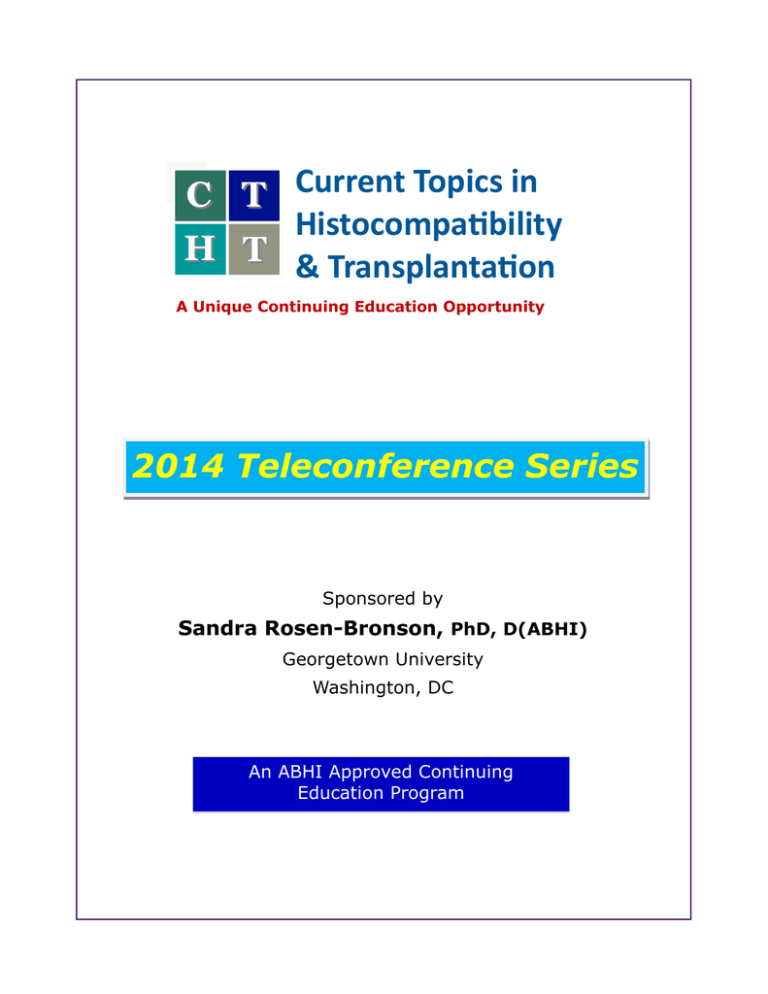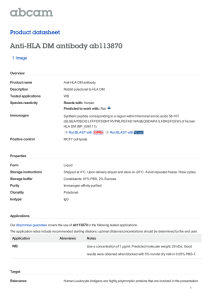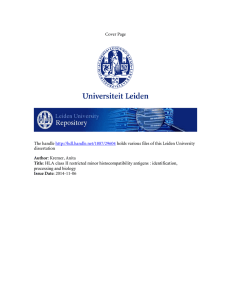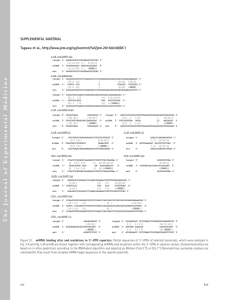2014 brochure - Current Topics in Histocompatibility
advertisement

C T Current Topics in Histocompa bility H T & Transplanta on A Unique Continuing Education Opportunity 2014 Teleconference Series Sponsored by Sandra Rosen-Bronson, PhD, D(ABHI) Georgetown University Washington, DC An ABHI Approved Continuing Education Program 2 Current Topics in Histocompatibility and Transplantation for Technologists This series of twenty interactive lectures, moderated by Dr. Sandra Rosen-Bronson, will reach hundreds of individuals through real-time, ninety minute in-depth audio conferences involving organizations and people from around the world. Without ever leaving your laboratory or office, you can listen to expert scientists and key decision makers thousands of miles away. Additionally, you can ask questions and get immediate answers as well as listen to other participants’ questions. This convenient and cost-effective educational tool will allow you to keep current in the field of histocompatibility testing and transplantation. Each participant will earn ABHI Continuing Education Credit (CEC) equal to 1.5 contact hours or 0.225 CEC per lecture. Frequently Asked Questions How Does a Teleconference Work? Three to five days before each lecture, a teleconference packet is mailed to your site coordinator. The packet will contain the lecture slides as a PowerPoint file and a PDF file, handouts as a PDF file, and detailed conference instructions all on a CD-ROM. At the scheduled time on the day of the lecture, your site must call the telephone number provided in the lecture packet. U.S. participants receive a toll-free telephone number. International participants may incur additional telephone charges. Once all conference sites have been connected, participants view the slide show as they listen to the lecturer. You will have an opportunity to participate in a question and answer session at a midpoint and at the completion of the lecture. All teleconferences are scheduled to start at 1:00 P.M. (Eastern Time) and last approximately ninety minutes. What If the CD Doesn’t Work Properly? If the CD you receive does not function properly, it will be replaced at no charge. As soon as you receive your conference packet, please verify that the CD contains the correct PowerPoint file and that it functions properly in your computer system. If you experience any difficulty with the CD or have a problem opening the files, contact us immediately. What If We Haven’t Received the Packet? If you do not receive your conference packet, please contact us no later than one day prior to the conference so that there is time for us to re-ship materials if necessary. What Equipment Do We Need On Site? You will need an LCD projector or computer with a monitor and a speakerphone. How Do We Register? Complete the registration form. Fax the form to: (202) 687-3717. Send the original registration form with complete credit card information or a check made payable to Georgetown University to: Overnight Courier: U.S. Mail: Sandra Rosen-Bronson Box 571438 Georgetown University 3900 Reservoir Road NW Washington, DC 20057-1438 Sandra Rosen-Bronson Preclinical Science Bldg, Room LE8H Georgetown University 3900 Reservoir Road NW Washington, DC 20007 In order to ensure your registration, it is important to write our complete and exact address as listed above. Cancellation Policy: Cancellations which occur 21 days or more prior to the date of the first lecture for which your site has registered are fully refundable less a nonrefundable deposit of $50. For cancellations which occur from 21 to 14 days prior, 50% of the lecture series fee will be forfeited. No refunds are possible after 14 days prior to the starting date. All cancellation requests must be submitted in writing. Further Questions: If you have any questions, please visit our website at www.ctht.info or contact us at: Tel: (202) 784-5518 or (202) 687-8924 Fax: (202) 687-3717 Email: bronson@gunet.georgetown.edu andre.thalberg@georgetown.edu www.ctht.info 3 2014 Teleconference Schedule All dates are Tuesdays (except April 3, 2014) and all lectures begin at 1:00 P.M. (Eastern Time) April 3, 2014 Umbilical Cord Blood: Banking and Transplantation presented by Joanne Kurtzberg, MD Director of Pediatric Blood and Marrow Transplantation, Duke University School of Medicine, Durham, NC Umbilical cord blood has become the hematopoietic stem cell source for a growing number of both pediatric and adult patients in need of HSC transplant. Participants will learn about state-of-the-art practices and advances in cord blood storage, expansion, and transplantation. April 29, 2014 Inflammatory Tipping Points in the Complement Cascade presented by William Baldwin, MD, PhD Cleveland Clinic Lerner Research Institute, Cleveland, OH The complement system includes a balance of anti-inflammatory and pro-inflammatory functions. Participants will learn about the relevance of such counterbalancing functions in innate immune responses to transplants and in predicting the consequences of therapeutic interventions. May 6, 2014 Current Data on the Clinical Relevance of C1q Binding Assays in Solid Organ Transplantation presented by John Lunz, PhD University of Pittsburgh, Pittsburgh, PA The utility and clinical relevance of testing the C1q binding capability of HLA antibody remains a question for discussion and debate. Participants in this conference will hear about clinical correlation data from the University of Pittsburgh’s transplant programs as well as the HLA laboratory’s experience with the C1q assay. May 20, 2014 Real-Time PCR for HLA Typing presented by Peter Lalli, PhD Histocompatibility Laboratory, Carolinas Health System, Charlotte, NC HLA typing using real-time PCR is an alternative method that may be particularly useful for laboratories where time sensitive deceased donor testing is performed. Participants in this conference will learn about the basic principles of real-time PCR and how it can be used for rapid DNA-based HLA typing. June 3, 2014 Disconnects with Solid-Phase HLA Antibody Assays: Reconnecting the Dots presented by Tiffany Roberts-Wilson, PhD and Gizem Tumer, MD Emory University Hospital, Atlanta, GA Solid-phase assays have become a mainstay of the clinical histocompatibility laboratory. However, while they have clearly had a positive impact on the field, discrepancies between different assay platforms often make interpretation of results complicated and sometimes misleading. Participants will learn how understanding the potential causes of discrepant results can aid in the interpretation of antibody specificities. www.ctht.info 4 June 17, 2014 Chimeric Antigen Receptor T Cells: Promising Treatments for Hematologic Malignancies presented by Marcela Maus, MD, PhD Abramson Cancer Center, University of Pennsylvania, Philadelphia, PA Chimeric T cell receptors (CARs) are engineered receptors that graft an arbitrary specificity onto an immune effector cell. Participants will learn about technologic advances and hear about clinical trial results from the University of Pennsylvania demonstrating that CARs represent a promising treatment for a variety of malignant diseases. June 24, 2014 Innate Immune Effector Mechanisms in Antibody-Mediated Rejection presented by Luis Hidalgo, PhD Walter Mackenzie Health Sciences Centre, University of Alberta, Edmonton, Alberta, CA In this lecture participants will learn about mechanisms of innate immunity. The conference will focus on the IgG subclass selectivity of Fc receptors expressed on different innate immune cells as well as the link between complement-fixing IgGs and Fc receptor effector functions. July 15, 2014 B Cell Basics presented by Maria-Luisa Alegre, MD, PhD Gwen Knapp Center for Lupus and Immunology Research, University of Chicago, Chicago, IL In this basic conference, participants will learn about how B cells develop and where they reside. In addition, they will learn about how B cells differentiate to become antibody producing plasma cells. July 22, 2014 Permissible Mismatches and Mismatching Effects in Hematopoietic Stem Cell Transplant presented by Marcelo Fernandez-Vina, PhD Stanford Medical School Blood Center, Palo Alto, CA This conference will explore the question of whether some HLA mismatches are less detrimental than others. Participants will also learn about the significance of mismatch direction and the cumulative effects of mismatches in bone marrow and cord blood transplantation. September 9, 2014 Fine-Mapping of HLA Associations for Hematologic Diseases using Registry Data presented by Loren Gragert, MS Bioinformatics Research, National Marrow Donor Program, Minneapolis, MN HLA genetic variants are associated with risk of autoimmune and infectious diseases as well as several different types of cancer. Participants will learn about how newly-developed statistical methods are being used to aid in the identification of new HLA variants associated with risk of hematologic diseases such as chronic lymphocytic leukemia (CLL), multiple myeloma, and severe aplastic anemia. www.ctht.info 5 September 16, 2014 Flow Cytometry Boot Camp: Building Your Knowledge and Improving Your Abs Detection presented by Robert Liwski, MD, PhD HLA Typing Laboratory, Queen Elizabeth II Health Sciences Centre, Halifax, Nova Scotia, CA Participants will learn about the basic principles of flow cytometry and luminex-based assays. They will gain an understanding of flow crossmatch methods and solid phase antibody detection assays as well as hear tips for troubleshooting and optimizing these assays. September 23, 2014 Transfusion Medicine: Unique Challenges for Transplant Patients presented by Julie Cruz, MD Indiana Blood Center, Indianapolis, IN Transplant recipients often face numerous clinical hurdles including challenges associated with blood transfusions. Through interesting case examples, the speaker will explore transfusion medicine conundrums encountered by transplant recipients. September 30, 2014 Risk Factors for and Impact of De Novo DSA presented by Chris Wiebe, MD Departments of Medicine and Immunology, University of Manitoba, Winnipeg, Manitoba, CA De novo donor-specific HLA antibody (DSA) develops in 15-25% of renal transplant recipients within five years of transplantation and is associated with decreased graft survival at ten years. Participants in this conference will learn about studies looking at risk factors for the development of DSA and potential strategies for identifying recipients with a greater risk for developing DSA. October 7, 2014 The Registry Diversity Project: Global HLA Haplotype Analysis presented by presented by Abeer Madbouly, PhD National Marrow Donor Program, Minneapolis, MN Participants in this conference will learn about a bioinformatics initiative aiming to cross-validate and improve current haplotype estimation tools. They will hear how the IHIW bioinformatics workgroup hopes to produce a comprehensive analysis of HLA data from 20 million donors from the Bone Marrow Donors Worldwide (BMDW) database. October 14, 2014 Vaccinations and Allosensitization presented by Thomas Ellis, PhD HLA Laboratory, University of Wisconsin School of Medicine, Madison, WI This conference will provide participants with an understanding of how vaccinations can be significant allosensitizing events. The speaker will discuss interesting case summaries and review possible mechanisms by which vaccines induce cellular and humoral responses against HLA antigens. www.ctht.info 6 October 28, 2014 Treating Donor Specific Antibody: Is There a Role for Proteasome Inhibitor Therapy? presented by E. Steve Woodle, MD Department of Surgery, Division of Transplantation, University of Cincinnati College of Medicine, Cincinnati, OH Participants will learn how proteasome inhibiting drugs such as bortezomib work and how they are being used to prevent and treat antibody mediated rejection. They will hear about current data and ongoing clinical trials aimed at evaluating the efficacy of proteasome inhibition therapies. November 4, 2014 Custom-Tailoring Your C1q Assay to Fit Your Transplant Program’s Needs presented by Robert Liwski, MD, PhD HLA Typing Laboratory, Queen Elizabeth II Health Sciences Centre, Halifax, Nova Scotia, CA and Olga Timofeeva, PhD Histocompatibility Laboratory, MedStar Georgetown University Hospital, Washington, DC Participants will learn how the C1q-binding assay can be developed and customized according to the needs of their laboratory and transplant programs. A comparison of three modified C1q protocols will be presented and will include data on how each modification correlates with CDC crossmatch methods and IgG single antigen bead assays. November 18, 2014 NGS Data Standards: Après Moi, le Déluge presented by presented by Martin Maiers, MS National Marrow Donor Program, Minneapolis, MN Next generation sequencing (NGS) methods for HLA and KIR are advancing the field of histocompatibility and immunogenetics. Typing results and associated meta-data are currently reported in a wide variety of formats, with little consistency in content. In order to prepare for a deluge of sequencing data, foster reproducibility and ensure data portability, community-developed data reporting guidelines and messaging formats are needed. Participants will learn about an ongoing initiative by the Immunogenomic NGS Data Consortium aimed at developing reporting guidelines for NGS of HLA and KIR. The standards will be presented along with a tour of tools and methods for how they can be utilized. December 2, 2014 US Kidney Allocation 2014 presented by Lee Ann Baxter-Lowe, PhD University of California San Francisco, San Francisco, CA This conference will provide participants with important information about the new kidney allocation system I ncluding critical dates and changes that directly affect histocompatibility laboratories. Discussion topics will include how the new system may alter our approaches to list management, unacceptable antigen reporting, transplant program agreements, and more. December 9, 2014 HLA Antibody Detection: Then and Now presented by Dong Li, MD and Olga Timofeeva, PhD Histocompatibility Laboratory, MedStar Georgetown University Hospital, Washington DC HLA antibody detection methods have evolved over time from complement dependent cytotoxicity to single antigen bead assays and beyond. However, even the newer solid phase assays have confounding factors such as high backgrounds interfering substances, and bead saturation that can make results tricky to interpret. In this conference participants will learn about solid phase assay pitfalls and potential solutions. www.ctht.info Current Topics in Histocompa bility & Transplanta on A Unique Continuing Education Opportunity 2014 www.ctht.info
![Anti-HLA DQ3 antibody [2HB6] ab20174 Product datasheet Overview Product name](http://s2.studylib.net/store/data/012451218_1-1dc1c11f13a3c3487a61cb14278554ed-300x300.png)


![Anti-HLA B7 antibody [BB7.1] (Phycoerythrin) ab33331](http://s2.studylib.net/store/data/012452308_1-0f63d688c04474266e06dd7edd77bb83-300x300.png)
